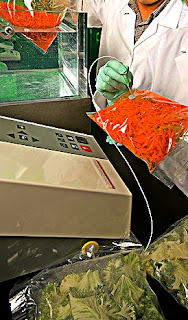Active packaging is
a modern method of packaging which involves the addition or
withdrawal of certain gases and liquids within food packages, in
order to prolong their shelf lives. Food industry is a major consumer
of active packaging materials. Oxygen scavenging, ethylene
scavenging, ethanol release, carbon dioxide release and water vapor
removal are some of the methods of active packaging. Fresh farm
produce and poultry are biologically active when packed in flexible
packaging materials. They release certain gases due to metabolism.
These gases tend to accumulate within the headspace of the packaged
food stuff. The accumulated gases cause the deterioration of the
packaged food. Scavengers are used to absorb these gases and liquids
accumulated within the headspace of the packaged materials, in order
to prevent their spoilage.
The increasing
demand for packaged food has been boosting the Active
Packaging Market. The growing
inclination of individuals towards packaged and ready to eat
foodstuffs has been propelling the active packaging market and this
trend is expected to continue within the forecast period. Chopped and
packaged fruits and vegetables employ active packaging to a large
extent as they release gases within the packaging. However,
incorporation of active packaging materials such as sorbents in food
packages is expensive, which is expected to hamper the market within
the forecast period. Nanomaterials and bio sensors detecting the
accumulation of gases within packaged food items are expected to open
new areas of opportunities for the active packaging market within the
forecast period.
Active packaging can
be in the form of absorbent sachets or they can be incorporated
within the packaging material. The latter mode of food preservation
is expensive; nonetheless it is being explored to a large extent by
contemporary packaging material providers. Besides absorbing gases,
active packaging can be designed to absorb dripping liquids,
controlling humidity, absorbing odors and maintaining the right
concentration of gases and moisture within the packaged food items.
Regions such as North America and Europe dominate the active
packaging market. Asia Pacific and rest of the world are nascent
markets for active packaging materials. Technological advances in the
field of active packaging are expected to make these materials
affordable which would increase their demand in Asia Pacific and rest
of the world countries. Advanced versions of active packaging
materials release controlled quantities of ethanol into bakery and
meat products in order to curb microbial growth in these food items.
The choice of active packaging material depends on the type of food
stuff it is designed to preserve. For instance, lowering of oxygen is
beneficial in case of cured meats, nuts and powdered milk. However,
in cheeses, fresh & processed meats and baked goods, carbon
dioxide has a beneficial effect. It imparts an antimicrobial effect
to certain food items. Therefore, it is paramount to choose active
packaging in accordance with the type of food product being
preserved. In case of ethylene scavenging, a pink colored indicator
is incorporated into the absorbent sachet in order to indicate the
amount of absorbent consumed. These sachets are used in ground coffee
and desiccated food items. Certain microbial inhibitors such as
ethanol and sulfur dioxide are released in controlled amount in baked
goods and cut fruits respectively, to inhibit microbial growth.
Get FREE Sample
PDF file of Active Packaging Market :
Some of the Key
Competitors in this market are
3M, AstraZeneca, Active Packaging, Accutech Packaging, Inc, Amelco
Desiccants Inc, BASF SE and DuPont among others.
About Us :
Transparency Market
Research is a global market intelligence company, providing global
business information reports and services. Our exclusive blend of
quantitative forecasting and trends analysis provides forward-looking
insight for thousands of decision makers. Our experienced team of
Analysts, Researchers, and Consultants, use proprietary data sources
and various tools and techniques to gather, and analyze information.

No comments:
Post a Comment